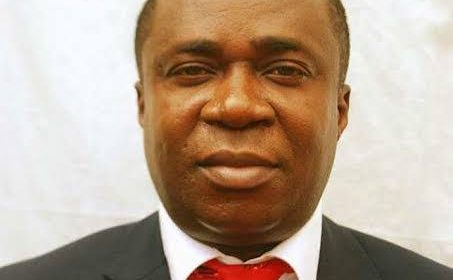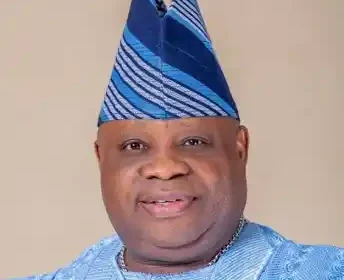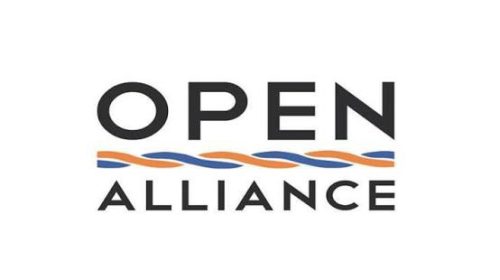Moghalu blames Nigeria’s N22.7 trillion Debt on Buharis Adimistration … Says his Budget Imposes High Debt Toll on Future of Young Nigerians
On signing the 2018 appropriation bill into law, yesterday, at the Presidential Villa in Abuja, President Muhammadu Buhari immediately relaunched the blame game that has delayed the budget for six months.
President Buhari expressed concerns over the alterations made by the National Assembly to the appropriation bill before passing it. Buhari said the alterations will make the budget difficult to implement.
In response, the National Assembly alluded to its “constitutional power of appropriation,” which empowers it to alter the budget proposal submitted to it by the President. The National Assembly also blames the executive for late submission of the 2018 budget and cited the failure of heads of MDAs to defend their budgets before the lawmakers on time.
This blame game smack of lack of leadership to make the budgetary process efficient and effective in serving the people of Nigeria.
At the root of Buhari’s complaint is the putative “constitutional power of appropriation” claimed by the National Assembly. We believe the executive should lay the controversy to rest by seeking judicial interpretation of the 1999 Constitution (as amended), on the power of the National Assembly to alter the yearly appropriation bill. If the power is legally valid, then effective collaboration between the executive and the legislature on the yearly budgets becomes imperative.
The Buhari administration has glossed over this judicial solution to, once and for all, solve the perennial problem of “budget padding.” The administration is instead relying on its trusted propaganda machinery, which entails blaming everyone else but itself and leaving Nigerian people unserved or underserved with fiscal policy.
The 2018 budget has seen the continuation with the longer-term dislocation of fiscal policy by the Buhari administration. In 2016, Buhari launched a streak of expansionary budgeting, fuelled by excessive debt. From a budget of N4.4 trillion in 2015, the budget rose sharply to N6.06 trillion in 2016, N7.4 trillion in 2017, and N9.12 trillion in 2018. On signing the latest budget, the President announced his plan for a supplementary budget in 2018. In just three years, the budget has more than doubled.
However, the two standout outcomes of the expansionary budgets have been economic recession that is followed by sluggish recovery, and unsustainable public debt. In 2016, the economy contracted by 1.5% (the worst in 25 years) and grew by a meagre 0.8% in 2017.
Meanwhile, the public debt increased from N12.1 trillion at the end of June 2015 (one month from the inauguration of the Buhari administration) to N22.7 trillion at the end of March, 2018. In less than three years, the public debt had increased by 87.6%.
At one level, this trend-growth makes the public debt unsustainable. In less than three years, we have utilised perhaps what could be the borrowing limit for a decade. At another level, the Nigerian national debt today is unsustainable, because we cannot service it through any period of oil revenue shock without a risky and costly debt restructuring as has already begun under Buhari, at a time that oil prices are at a decent level of above $70 a barrel.
Moreover, the cost of debt service as a ratio of government revenue now hovers around 60%. And not one kobo of allocation for capital expenditure is any longer covered by government revenue. Capital expenditure allocation is entirely funded by borrowing, even as the country’s debt repayment is also being funded by debt.
Finally, on the budgetary debacle, the Buhari administration had with the 2016 and 2017 budgets spent more than N3 trillion on capital expenditure. This is unprecedented in the history of budgeting in Nigeria. The administration flashes this scorecard to Nigerians. But the problem is that infrastructure project delivery in the country in these two fiscal years was underwhelming, without any major improvement in the country’s infrastructure stock.
Therefore, the debt-fuelled expansionary budgets of this administration are doing incalculable damage to the fiscal future of the country. It will impose a hefty debt burden on current young Nigerians in the future.
We believe that a competent leader with knowledge and character is what Nigeria needs to steer fiscal policy to support sustainable economic growth and development of Nigeria. We also believe that the foreign borrowing binge of the Buhari administration must be curtailed as an inevitable part of recreating our country’s future, a future in which Nigerians of the next generations would not be saddled with crippling public debt.
Professor Kingsley Moghalu, a presidential aspirant of the Young Progressive Party (YPP), is ready to provide this leadership for our country from May 2019.







Leave a Reply